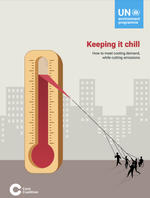Malcolm McCulloch
Director
Cooling is necessary for the quality of life of billions of people living in developing countries and, increasingly, for those developed countries traditionally unprepared for ever more frequent heatwaves due to climate change.
The energy needed for air conditioning is likely to triple by 2050, with ten new air conditioning units projected to be sold every second for the next 30 years. This huge demand has the potential to drive up greenhouse gas emissions and therefore further exacerbate the very problem it is designed to alleviate.
Shaping future cooling demand patterns is potentially the most significant opportunity we have to moderate the trajectory of energy demand. However, we do not yet understand where the greatest social, technical and economic innovations could be made, and therefore lack an evidence base for interventions. Similarly, the benefits of cooling for reducing rates of heat-related illness have not yet been fully researched.
This study investigates the future of cooling as a dynamic system, and examines its interlinkages across Sustainable Development Goals (SDGs) in the developing and developed world. Our aim is to steer the system towards sustainable cooling for all, and to establish cooling as a global priority for the successful implementation of the SDGs.
We are concentrating on space cooling (from air conditioning, fans, and other, non-energy-dependent passive cooling techniques), which is the largest energy consumer amongst the cooling sectors, and are examining three critical, inter-related aspects of future cooling.
These include:
Our methods include surveys and trend analysis, modelling, experiments, qualitative fieldwork and case studies in fast-growing developing countries (India and South Africa) and developed countries at risk of increased heatwaves (France and the UK).
Our research focuses explicitly on creating solutions, including policy influence on cooling energy demand and social aspects of climate mitigation, the design and implementation of alternative supply chains, enhancing the uptake of the best-in-class refrigerant gases as well as evidence-based guidelines to better handle the healthcare burden of severe heat.
In addition to its focus on space cooling, the programme is critically assessing agricultural and industrial cold-chain systems. It is developing a typology of different types of cold chains and evaluating them in terms of their environmental, economic and social sustainability. Crucially, in addition to suggesting their optimised design, it aims to derive context-specific policy recommendations how governments can best incentivise, govern and regulate low-carbon and effective cold chains.
Advisory Board
Our Advisory Board oversees the work of the programme, and has comprised of the following members: Amory Lovins (Co-founder and Chairman Emeritus, Rocky Mountain Institute), Brian Motherway (Head of the Energy Efficiency Division, International Energy Agency), Damilola Ogunbiyi (CEO, Sustainable Energy for All), Dan Hamza-Goodacre (Executive director, Kigali Cooling Efficiency Program), Iain Campbell (Senior Fellow, Rocky Mountain Institute), Paul Glasziou (Director of the Institute for Evidence-Based Healthcare, Bond University), Tina BirmpilI (Executive Secretary, United Nation Environment Programme Ozone Secretariat), Sam Bickersteth (CEO, Opportunity International, and panel chair).

Climate change is already bringing higher average temperatures and an increased number of heatwaves. Societies need to plan now for how they will keep people comfortable, healthy and economically productive in these temperatures, and to do so sustainably.
Read the Featured ArticleResearchers from the Oxford Martin Programme on the Future of Cooling have predicted the impact of rising temperatures on climate adaptation requirements for cooling on a country-by-country basis if climate targets are missed.
The Oxford Net Zero initiative draws on the university’s world-leading expertise in climate science and policy, addressing the critical issue of how to reach global ‘net zero’ – limiting greenhouse gases – in time to halt global warming.
Growing international demand for cooling is set to drive one of the most substantial increases in greenhouse gas emissions in history – but the risks and benefits of sustainable cooling remain a global blind spot, according to research.
The arrival of summer in the Northern Hemisphere has caused increased interest, from both the research community and the public at large, about the possibility that warmer weather might slow the spread of COVID-19.

Ensemble of global climate simulations for temperature in historical, 1.5 °C and 2.0 °C scenarios from HadAM4

Global Cooling Watch 2023

Understanding systemic cooling poverty

Change in cooling degree days with global mean temperature increasing from 1.5 °C to 2.0 °C

Overcoming the incumbency and barriers to sustainable cooling

The multidimensionality of energy poverty in Brazil: A historical analysis
How to Properly Cool Your Home With a Fan
How to stay cool without air con – and help take some heat off the planet
How to make homes cooler without cranking up the air conditioning
How can we keep homes cool in extreme heat without air conditioning?
UK told to prepare for possible 30% increase in uncomfortably hot days
UK and Switzerland to suffer highest increase in 'uncomfortably hot days' globally, study finds
18th October 2022: 10:00am
31st May 2022: 5:00pm
7th June 2022: 5:00pm
24th May 2022: 5:00pm
16th May 2022: 5:00pm
26th April 2022: 5:00pm
8th March 2022: 5:00pm
If you found this page useful, sign up to our monthly digest of the latest news and events
Subscribe